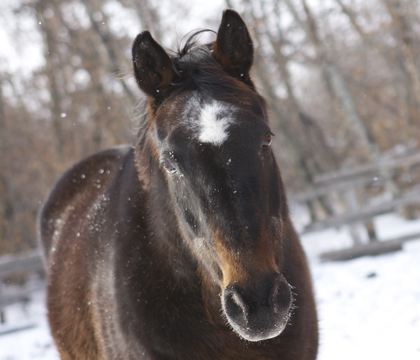
Public review draft equine code of practice
The draft code can be viewed and submissions made at the NFACC site until February 14, 2013.
By Myrna MacDonald
All stakeholders are encouraged to provide input to ensure that this code reflects a common understanding of equine care expectations and recommended practices in Canada.
A Scientists' Committee report summarizing research on priority welfare topics for equines can be found online alongside the draft code. This peer-reviewed report aided the discussions of the Code Development Committee as they prepared the draft code of practice.
"I'm proud of the collaborative effort committee members have shown since we began our work in early 2011," says Jack de Wit, director with the Equine Canada Board of Directors and chair of the Code Development Committee. "The next step is opening the draft code to input from the public. With the public's help we will have a code that is good for owners and the animals in their care."
"As an equine veterinarian and horse owner, it's a pleasure to participate in a code process that provides an opportunity to advance the welfare of equines across our diverse industry," says Dr. Bettina Bobsien, Canadian Federation of Humane Societies' representative on the Code Development Committee.
"It is important that this code reflect the best practices available for the welfare of horses, donkeys and mules."
Anyone can provide comments and suggestions on the Code. All submissions must be made through the online system and follow the instructions provided at the NFACC site.
The equine code revision is led by an 18-person Code Development Committee, which includes participants from across Canada representing the diversity of the industry.
Members include horse owners, caregivers, animal welfare and enforcement representatives, researchers, veterinarians and government representatives. Dr. Katharina Lohmann, an associate professor in the Western College of Veterinary Medicine's Department of Large Animal Clinical Sciences, is among the committee's 18 members.
The Scientists' Committee includes researchers with expertise in equine behaviour, health and welfare. Among committee members is Dr. Trish Dowling, a professor in the WCVM's Department of Veterinary Biomedical Sciences.
The final equine Code of Practice will be released in June 2013. More information on the Code development process is available on the NFACC site.
The equine Code is one of eight Codes of Practice currently under revision as part of a multi-year NFACC project. Codes of Practice serve as Canada's national understanding of animal care requirements and recommended practices. The codes cover housing, feed and water, handling, euthanasia, transport and other important management practices.
For more information, visit the NFACC site.
A Scientists' Committee report summarizing research on priority welfare topics for equines can be found online alongside the draft code. This peer-reviewed report aided the discussions of the Code Development Committee as they prepared the draft code of practice.
"I'm proud of the collaborative effort committee members have shown since we began our work in early 2011," says Jack de Wit, director with the Equine Canada Board of Directors and chair of the Code Development Committee. "The next step is opening the draft code to input from the public. With the public's help we will have a code that is good for owners and the animals in their care."
"As an equine veterinarian and horse owner, it's a pleasure to participate in a code process that provides an opportunity to advance the welfare of equines across our diverse industry," says Dr. Bettina Bobsien, Canadian Federation of Humane Societies' representative on the Code Development Committee.
"It is important that this code reflect the best practices available for the welfare of horses, donkeys and mules."
Anyone can provide comments and suggestions on the Code. All submissions must be made through the online system and follow the instructions provided at the NFACC site.
The equine code revision is led by an 18-person Code Development Committee, which includes participants from across Canada representing the diversity of the industry.
Members include horse owners, caregivers, animal welfare and enforcement representatives, researchers, veterinarians and government representatives. Dr. Katharina Lohmann, an associate professor in the Western College of Veterinary Medicine's Department of Large Animal Clinical Sciences, is among the committee's 18 members.
The Scientists' Committee includes researchers with expertise in equine behaviour, health and welfare. Among committee members is Dr. Trish Dowling, a professor in the WCVM's Department of Veterinary Biomedical Sciences.
The final equine Code of Practice will be released in June 2013. More information on the Code development process is available on the NFACC site.
The equine Code is one of eight Codes of Practice currently under revision as part of a multi-year NFACC project. Codes of Practice serve as Canada's national understanding of animal care requirements and recommended practices. The codes cover housing, feed and water, handling, euthanasia, transport and other important management practices.
For more information, visit the NFACC site.
